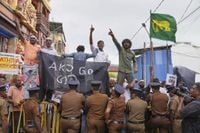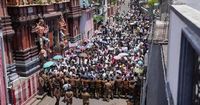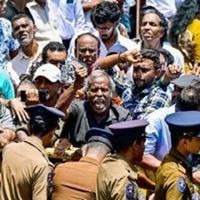On a sweltering Tuesday in Colombo, the political landscape of Sri Lanka was shaken as former President Ranil Wickremesinghe, once the nation’s most powerful leader, was granted bail after his dramatic arrest on allegations of misusing public funds. The saga, which has ignited fierce debate and drawn thousands to the streets, marks an unprecedented moment in Sri Lankan history: never before has a former head of state been taken into custody on such charges.
Wickremesinghe’s arrest, which took place last Friday, August 22, 2025, sent shockwaves through the country. According to the Associated Press, he stands accused of using public funds to attend his wife’s graduation ceremony in London, following an official visit to Cuba and the United States in 2023. The case is part of a sweeping anti-corruption drive spearheaded by President Anura Kumara Dissanayake, who won office last year on a platform promising to root out graft at the highest levels of government.
But the drama didn’t end with the arrest. Wickremesinghe, a senior opposition figure and seasoned statesman, was admitted to Colombo National Hospital on Saturday, August 23, for dehydration and related health complications. Doctors placed him in intensive care, and his condition has since stabilized, according to Dr. Pradeep Wijesinghe, a director at the hospital who spoke to local media on Monday. With his health in question, Wickremesinghe joined Tuesday’s bail hearing remotely from his hospital room—a scene that underscored both the gravity of the accusations and the fraught state of Sri Lankan politics.
As news of the court proceedings spread, the streets outside the courthouse filled with thousands of Wickremesinghe’s supporters. Waving black flags and chanting slogans, they denounced the arrest as a political witch hunt orchestrated by the new administration. The crowd’s anger was palpable. Samarasiri Kuruwitaarachchi, a 69-year-old protester, voiced the frustration felt by many: “We condemn the arrest of Wickremesinghe who has done so much for the country. We gathered here to demand justice for him.” Kuruwitaarachchi didn’t mince words, accusing the government of failing to deliver on its election promises and now “trying to hunt down the political opponents.”
After the hearing concluded and news broke that Wickremesinghe had been granted bail, his supporters erupted in celebration—cheering, dancing, and vowing to continue their fight for what they see as justice. The intensity of the protests highlighted the deep divisions that remain in Sri Lanka’s political fabric, even as the country attempts to move past the economic and social turmoil of recent years.
Wickremesinghe’s case is emblematic of the broader reckoning underway in Sri Lanka. President Dissanayake’s anti-corruption campaign has cast a wide net, targeting dozens of former government and political leaders. Yet, it is Wickremesinghe’s arrest that stands out—not only for its historic nature but also for the questions it raises about the balance between accountability and political retribution.
Opposition lawmakers have been quick to argue that the arrest undermines the country’s democracy. They see it as a troubling signal that political vendettas may be taking precedence over due process. “The government has failed to deliver on the promises made to the people in last year’s election and is now trying to hunt down the political opponents,” echoed Kuruwitaarachchi, reflecting the concerns of many in the opposition ranks.
On the other side of the aisle, government officials insist that the process has been fair and above board. Transport Minister Bimal Rathnayake, speaking to local media on Monday, August 25, defended the arrest as lawful and consistent with the government’s mandate. “The government has a mandate to investigate the alleged malpractices of previous governments and the law will be enforced equally,” he said, pushing back against claims of a politically motivated crackdown.
For many Sri Lankans, the spectacle of a former president in intensive care, appearing before a magistrate via remote link, is both surreal and sobering. Wickremesinghe’s political journey has mirrored the country’s own tumultuous path. He rose to the presidency in 2022 amid a wave of economic upheaval that forced then-President Gotabaya Rajapaksa to resign. In the aftermath, Wickremesinghe’s government managed to stabilize the economy: inflation fell, the local currency strengthened, and foreign reserves increased. Yet, these achievements came at a cost. Stringent austerity measures—necessary, some argued, to right the nation’s finances—sparked widespread public backlash and eroded his support base.
The allegations now facing Wickremesinghe have only deepened the sense of uncertainty. His party maintains that he attended his wife’s graduation ceremony in an official capacity, having received an invitation as part of his diplomatic itinerary. But the government’s anti-corruption unit sees things differently, alleging that public funds were improperly diverted for personal use.
The legal battle is far from over. Details of the bail conditions remain sparse, and it is unclear when Wickremesinghe will be well enough to appear in court in person. What is certain, however, is that the case has galvanized both his supporters and critics, with each side seeing in it a reflection of the country’s ongoing struggle to define its democratic identity.
Amid the legal wrangling and street protests, ordinary Sri Lankans are left grappling with tough questions. Is the government’s anti-corruption drive a genuine effort to clean up the system, or is it a smokescreen for settling old scores? Are the charges against Wickremesinghe an overdue reckoning, or a dangerous precedent that threatens the rule of law?
For President Dissanayake, the stakes could hardly be higher. Having campaigned on a promise to root out corruption and restore trust in government, he now faces the challenge of delivering justice without appearing to trample on the rights of his political opponents. The outcome of Wickremesinghe’s case may well shape public perceptions of the administration’s legitimacy for years to come.
As the dust settles on this week’s events, one thing is clear: Sri Lanka stands at a crossroads. The country’s ability to navigate this crisis—balancing the demands of transparency, accountability, and democratic fairness—will determine not just the fate of one former president, but the future direction of the nation as a whole.



